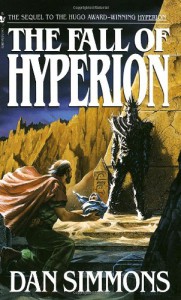The Fall of Hyperion
 Four stars, but still fantastic. I think you'll see that the gripes I have are pretty minor and would probably have been alleviated by some time in between reading the first and second book rather than reading them back-to-back as I did.
Four stars, but still fantastic. I think you'll see that the gripes I have are pretty minor and would probably have been alleviated by some time in between reading the first and second book rather than reading them back-to-back as I did.Simmons has got a lot of really great things going for him in this series. John Keats's poetry serves as a framework for a massive science fiction epic that sprawls centuries and solar systems and what's not to love about that idea? For those of you not "in the know," the Hyperion Cantos are set in the 29th century with humankind spread out among the stars after the death of "Old Earth" and connected by a web of farcasters that allow instantaneous transportation between worlds and dominated by an expansive Romanesque government called the Hegemony. By the time of this novel, the newest Hegemony world of Hyperion is under attack by a group of humans who made their dwelling beyond the web called the Ousters and a massive conspiracy is unravelling that involves intrigue among key members of the Hegemony, factions within the TechnoCore (an AI civilization that frequently assists the Hegemony with technological issues) and the Ousters themselves that involves discovering and utilizing the secrets of the world of Hyperion to influence the direction of the developmental future of human civilization.
The narrative structure of Hyperion Falls is interesting and thought-provoking, but jarringly different from the first book when read back-to-back. Gone is the Canterbury Tales/Decameronesque narrative structure of travelers telling their stories to pass the time and in it's place is the central narration of a new, but familiar cybrid entity known as Joseph Severn. Severn provides us with an outside perspective and a window to the wider galaxy that we didn't have with the claustrophobic and Hyperion-centered narrative of the pilgrims in book one. Severn's tale is one of intrigue, galaxy-wide war and the destruction of worlds, which provides an interesting change of both perspective and space. We still get that intimate view of the pilgrims though, because, here's the trick, Severn can see what they're doing in his dreams. We get alternating first person and third person narratives as severn records his thoughts and then dreams of events external to himself. Sometimes the change in perspective feels a little hokey, but all-in-all it suits the structure, and the structure itself isn't bad - I just really liked the style of the first book and again, back-to-back that change is slightly jarring to the reader and calls undue attention to formatting rather than story and character. The format does build dramatic tension rather brilliantly and a sense of urgency is maintained throughout the work in spite of the physical realities of relativistic time debts which I thought particularly genius from both a scientific and literary stand point.
The fact that the lives of the pilgrims on Hyperion and the fulfillment of their various destinies are revealed in dreams to Severn begs a lot of interesting philosophical questions. These works are heavily laden with poetic and historical allusions and the central theme/question of art mirroring life or life mirroring art is used with great effect throughout. Between Silenus, the Keats retrieval persona and Severn himself, there's a lot of witty dialogue about poets dreaming worlds into existence which adds a touch of the fantastic to the entire story. Is the story merely the fevered dreaming of a poet? Is it real? Or are the events real, while the characters metaphysically project their lives and reality onto the imaginings of some dreaming ultimate intelligence that may or may not exist? The nature of divinity is also addressed with some great success throughout the series, primarily through the ethical evolutionary studies of Sol Weintraub and his dissection of Abraham's Dilemma and secondarily through the goals and self-image of the TechnoCore's primary factions. It's perhaps easiest to see Keats's influence on Simmons work in this respect. Simmons's work mirrors Keats's by focusing on the will to power and succession of one group over another. Just as the Olympians replaced the Titans, humanity is threatened by their own progeny - the artificial intelligence they've created.
This is a pretty solid first conclusion to events set in motion in the previous book. The resolution is gripping and fittingly epic. I mentioned in my previous review of Hyperion that there are loose ends that Simmons doesn't feel compelled to completely tie-up for you and the same can be said here. The major elements of the Shrike mystery and the Time Tombs will be explained, but there's enough air of mystery here to keep you pondering things after the final page. If you're not a fan of this type of fiction (Lost comes to mind pretty readily), you may feel a little cheated. Then again, there are two books left in the series and all may be laid to rest ere the penultimate conclusion.
It's easy to see why this series has generated so much excitement. I'm honestly surprised it's not higher than 51 on NPR's list of greatest science fiction novels of all time. Granted, Simmons had the luxury of writing in the wake of Herbert's Dune and Asimov's Foundation series, both of which are extremely influential on the Hyperion universe. That being said, I think that Simmons takes those basic elements to a much higher degree of complexity and completeness. His series has a feeling of urgency missing in Foundation and a degree of scientific complexity and fulfillment of destiny that may be (blasphemy I know!) better than Dune's. It certainly belongs far, far above the Ender series.



